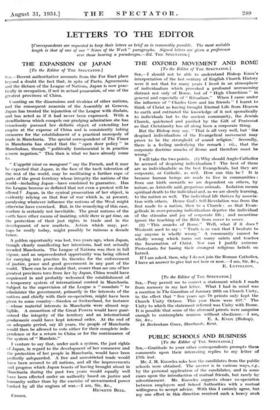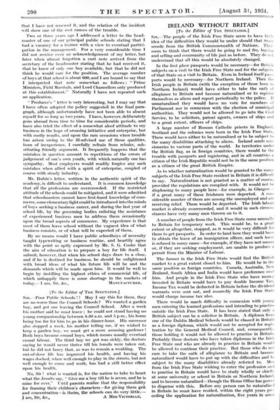PUBLIC SCHOOLS AND BUSINESS
[To the Editor of THE SPECTATOR.]
Sim,—Gratitude to your other correspondents prompts these comments upon their interesting replies to my letter of 17th inst.
Mr. J. M. Knowles asks how the candidates from the public schools were obtained. The answer is in various ways, e.g., by the personal application of the candidates, and in some cases upon the introduction of mutual friends, but rarely by advertisement. Mr. Knowles suggests closer co-operation between employers and School Authorities with a mutual -willingness to accept advice. With this I entirely agree, but my one effort in this direction received such a heavy snub that I have not renewed it, and the relation of the incident will show one of the root causes of the trouble.
Two or three years ago I addressed a letter to the head- master of one of our principal public schools stating that I had a vacancy for a trainee with a view to eventual partici- pation in the management. For a very considerable time I did not receive even an acknowledgement of my letter, but later when almost forgotten a curt note arrived from the secretary of the headmaster stating that he had received it, that he knew of only one boy available, but that he did not think he would care for the position. The average number of boys at that school is about 600, and I am bound to say that I interpreted that note somewhat as follows : " Prime Ministers, Field Marshals, and Lord Chancellors only produced at this establishment." Naturally I have not repeated such an application.
Producer's " letter is very interesting, but I may say that I have often adopted the policy suggested in the final para- graph, although unfortunately have not been able to absent myself for so long as two years. I have, however, deliberately gone abroad from time to time for considerable periods, and have also tried the effect of a somewhat aloof attitude to my business in the hope of arousing initiative and enterprise, but with costly results, and upon the rare occasions when trouble has arisen owing to the ill-advised use of those qualities, born of inexperience, I carefully refrain from rebuke, sub- stituting friendly argument. It frequently happens that the mistakes in question amount to repetitions of the errors of judgement of one's own youth, with which naturally one has sympathy. Most employers would readily forgive any such mistakes when allied with a spirit of enterprise, coupled of course with steady industry.
Mr. Rubin's letter, written in the authentic spirit of the academy, is difficult to understand. It is common knowledge that all the professions are overcrowded. If the restricted attitude of the schools could be mitigated, and it were admitted that schoolmasters cannot have first-hand knowledge of com- merce, some elementary light could be introduced into the minds of boys seeking a business career, and during the last year of school life, by the governing bodies enlisting the assistance of experienced business men to address them occasionally upon the broad aspects of commerce. My .experience is that most of them leave school without the vaguest idea of what business consists, or of what will be expected of them.
By no means would I have public schoolboys of necessity taught typewriting or business routine, and heartily agree with the point so aptly expressed by Mr. S. G. Cooke that the aim of education is to prepare a boy for life itself. I submit, however, that when his school days draw to a close, and if he is destined for business, he should be enlightened with broad ideas of what his future life will be and the demands which will be made upon him. It would be well to begin by instilling the highest ethics of commercial life, of which unhappily there is some shortage in the markets of







































 Previous page
Previous page